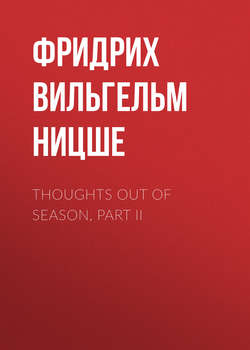Читать книгу Thoughts Out of Season, Part II - Фридрих Вильгельм Ницше - Страница 2
THE USE AND ABUSE OF HISTORY.
PREFACE
Оглавление“I hate everything that merely instructs me without increasing or directly quickening my activity.” These words of Goethe, like a sincere ceterum censeo, may well stand at the head of my thoughts on the worth and the worthlessness of history. I will show in them why instruction that does not “quicken,” knowledge that slackens the rein of activity, why in fact history, in Goethe's phrase, must be seriously “hated,” as a costly and superfluous luxury of the understanding: for we are still in want of the necessaries of life, and the superfluous is an enemy to the necessary. We do need history, but quite differently from the jaded idlers in the garden of knowledge, however grandly they may look down on our rude and unpicturesque requirements. In other words, we need it for life and action, not as a convenient way to avoid life and action, or to excuse a selfish life and a cowardly or base action. We would serve history only so far as it serves life; but to value its study beyond a certain point mutilates and degrades life: and this is a fact that certain marked symptoms of our time make it as necessary as it may be painful to bring to the test of experience.
I have tried to describe a feeling that has often troubled me: I revenge myself on it by giving it publicity. This may lead some one to explain to me that he has also had the feeling, but that I do not feel it purely and elementally enough, and cannot express it with the ripe certainty of experience. A few may say so; but most people will tell me that it is a perverted, unnatural, horrible, and altogether unlawful feeling to have, and that I show myself unworthy of the great historical movement which is especially strong among the German people for the last two generations.
I am at all costs going to venture on a description of my feelings; which will be decidedly in the interests of propriety, as I shall give plenty of opportunity for paying compliments to such a “movement.” And I gain an advantage for myself that is more valuable to me than propriety – the attainment of a correct point of view, through my critics, with regard to our age.
These thoughts are “out of season,” because I am trying to represent something of which the age is rightly proud – its historical culture – as a fault and a defect in our time, believing as I do that we are all suffering from a malignant historical fever and should at least recognise the fact. But even if it be a virtue, Goethe may be right in asserting that we cannot help developing our faults at the same time as our virtues; and an excess of virtue can obviously bring a nation to ruin, as well as an excess of vice. In any case I may be allowed my say. But I will first relieve my mind by the confession that the experiences which produced those disturbing feelings were mostly drawn from myself, – and from other sources only for the sake of comparison; and that I have only reached such “unseasonable” experience, so far as I am the nursling of older ages like the Greek, and less a child of this age. I must admit so much in virtue of my profession as a classical scholar: for I do not know what meaning classical scholarship may have for our time except in its being “unseasonable,” – that is, contrary to our time, and yet with an influence on it for the benefit, it may be hoped, of a future time.
